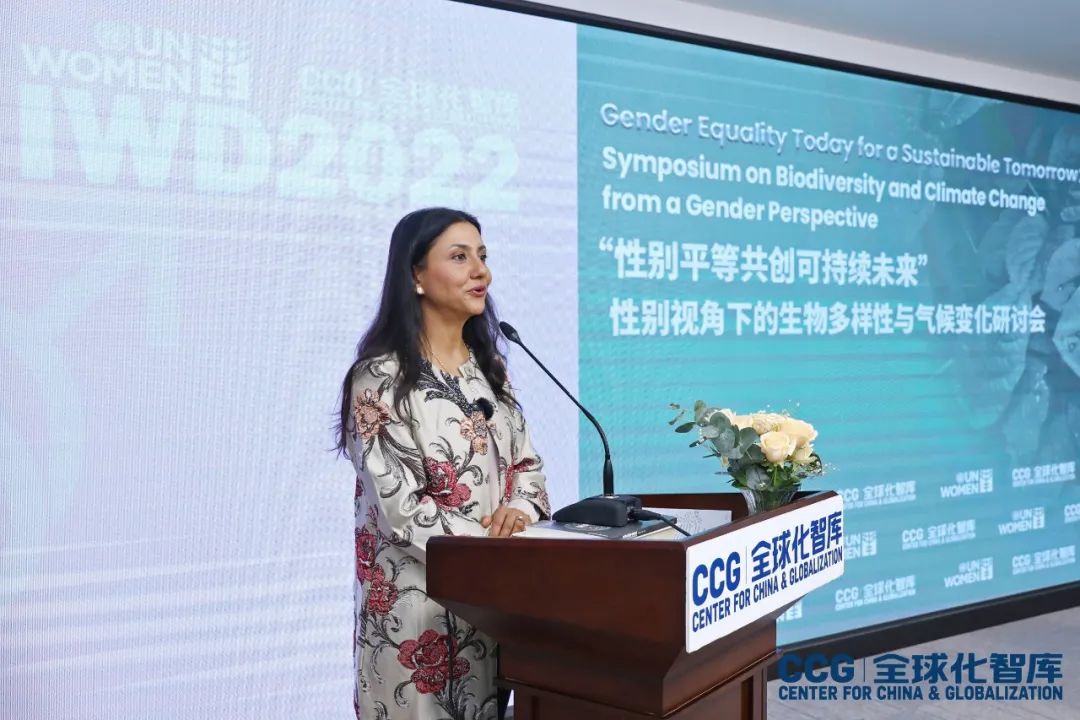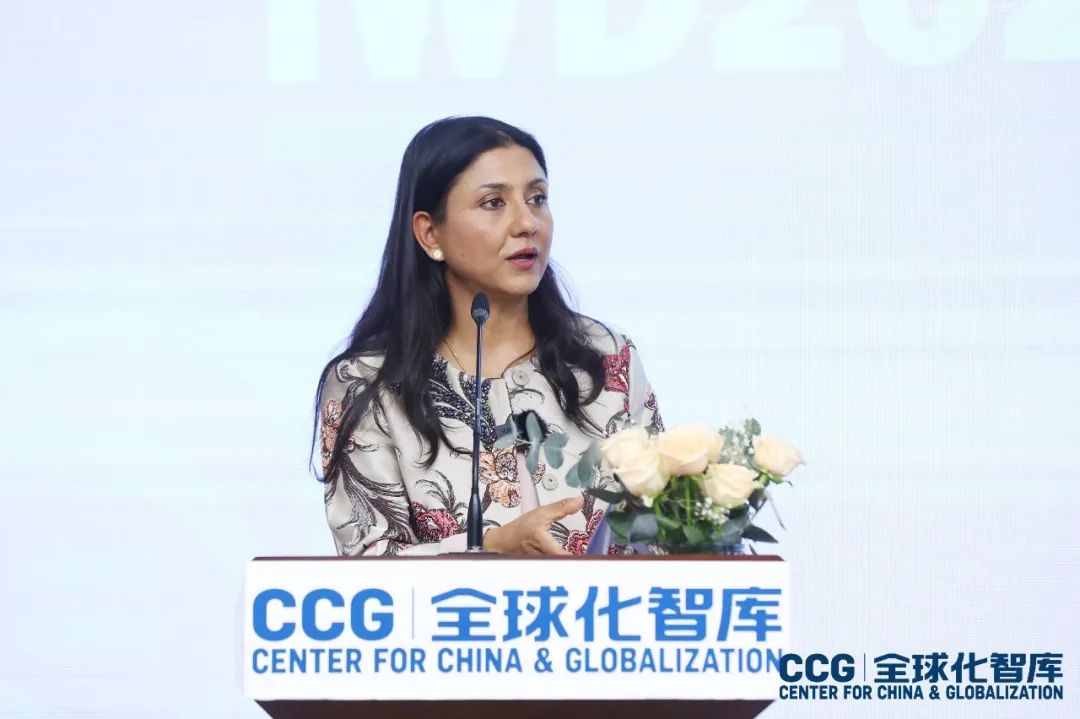Smriti Aryal’s Remarks on CCG Women’s Day Symposium
March 08 , 2022
On March 8th, the Center for China and Globalization (CCG) and UN Women China hosted “Gender equality today for a sustainable tomorrow: a symposium on biodiversity and climate change from a gender perspective” at CCG’s Beijing headquarters.

Smriti Aryal, Country Representative, UN Women China, gave an opening address. Full text is as below.
Excellencies, representatives from the Government of China, Distinguished Guests, and Colleagues, a very good afternoon.
On behalf of UN Women, I would like to extend our warmest welcome to everyone joining us today. We are happy to partner with CCG to co-organize the event on such an important day. As we know, today is International Women’s Day, a day to celebrate women’s leadership and contribution to this world and the planet. This year, the theme is “Gender equality today for sustainable tomorrow.”
Even though the celebration is taking place at troubled times in the world, our work must go on. So, let me take the opportunity to acknowledge and honor many women in or outside this room, both in China and globally, for their relentless contribution for the betterment of the world, our planet, and the people.
So, today I want to start by highlighting how these issues are interrelated.
Climate change, biodiversity loss, environmental crises have differential impact on women and girls. Women are 14 times more likely to die than men during a disaster, and account for around 80% of climate refugees globally. Women make up 43% of the global agricultural workforce, playing a central role in biodiversity conservation and sustainable food and agricultural systems. But only 20% of landowners are women, and only 22% of rural women in low-income countries hold bank accounts. Women make up 32% of the renewable energy workforce but are concentrated in lower-paying non-technical positions. These statistics are telling: they indicate women encounter structural inequalities such as informal nature of work including low paying jobs and livelihood insecurity, high burden of unpaid care and household work, gender-based violence, limited access to resources – making them more prone to climate and disaster hazards and shocks and deterring them from effectively participating in this cause.
And yet, (my second point) when women are empowered to participate and lead meaningfully, it makes climate action more effective. Existing global evidence shows that women’s participation leads to better outcomes in natural resource management and climate interventions at the local level. Simply having more women parliamentarians elected and represented in policy making leads to adoption of more stringent climate change policies that result in lower emissions. Including women in local forest committees improves information and communication on the need for conservation, including by conveying conservation ethics to children, increases community monitoring of forest use violations and enables the application of knowledge of forest plants and species. I could go on…
However, (my third point) the current climate actions have glaring gender gaps in policy, programmes, and investments. Firstly, only 15% of all environment-related ministries have a female minister. The low participation of women in climate governance and decision-making can mean absence of women’s voice and insufficient gender considerations in laws and policies. The progress on the globally agreed gender related commitments in the UN Framework Convention on Climate Change nationally determined contributions is slow: with only 24 per cent of 120 countries identifying national gender equality institutions as part of climate change governance and only 27 per cent noting the importance of women’s participation in decision-making on climate action. In the key climate financing and investment architecture globally, some emphasis on gender considerations into the project design has been enhanced, but there isn’t clear indication on the outcomes of these effort to truly transform the lives of women.
Finally, the lack of sex disaggregated, and gender statistics continues to be a gap in climate and environmental policy making and investment decision.
Nevertheless, where there are challenges, there are always solutions. And I would like to propose four areas of recommendations for your consideration:
- Enhance capacity of stakeholders to collect, analyze, disseminate, and use gender-disaggregated data on climate change, environmental and systemic risks, and disaster impacts. This is foundational for scientific policy making and prioritizing investments and to ensure that environmental policies and programmes reflect emphasis on strengthening resilience and adaptive capacities of women and girls.
- Strengthen coordination and gender mainstreaming across sectors and all levels of government for the integrated formulation and implementation of gender-responsive climate change, environmental and disaster risk reduction policies, and programmes. This includes development of gender equality standards, gender capacity development, and adequate funding for implementation, including in international development cooperation mechanisms.
- Strengthen women’s resilience especially those who work in informal sector and most vulnerable to socio-economic shocks, by improving their livelihood +income, strengthening social security benefits, and ensuring their access to information, training and tools including for climate-smart agriculture tools and mechanisms, digital technology. To better address this, it is particularly important to increase targeted finance to informal businesses, especially micro-, small, and medium-sized enterprises owned by women, and provide them with diverse financial instruments, including concessional loans, risk guarantees and grants.
- Furthermore, utilize women’s real and potential capabilities in the green transitions that are taking place. Environmental sustainability could itself create up to 24 million new green jobs globally and this requires preparing women through participation, skilling and upskilling for these opportunities and utilizing their knowledge (including often indigenous knowledge), network, and social capital for planet, people, and prosperity.
Finally, there is a unique opportunity in China to advance this agenda. In last year’s COP15 at Kunming, President Xi Jinping has committed to establishing a 232-million-dollar fund for biodiversity protection in developing countries. Given the essential role women are playing in forestry, fishery, land management, water resources management and renewable energy, this is a great opportunity to enhance targeted support towards promising women’s empowerment programmes that are win-win: for climate action and for gender equality.
Moreover, with China’s global leadership on climate change, and with rapid economic development and progress in poverty alleviation, rural revitalization, digital innovation and green development, the country could be a global example for the green transition that is also gender-just. As UN Women, we stand ready alongside other UN sister agencies to support all relevant stakeholders to integrate and implement gender equality in climate and environmental actions towards realizing the international and national commitments and the Agenda2030.
At last, I thank you excellencies and distinguished guests once again for joining us today and to CCG for jointly organizing the event with UN Women and hosting the dialogue at their premise. We have many outstanding speakers with us today, and I do hope we will develop some consensus on critical actions needed to advance these interlinked global and national agenda.
Looking forward to hearing all the insights! Thank you!
Topical News See more






